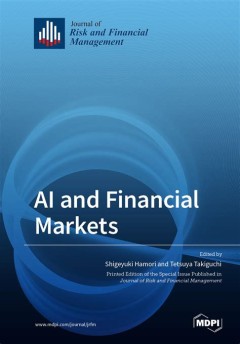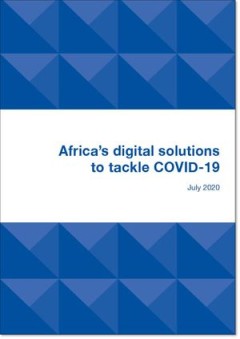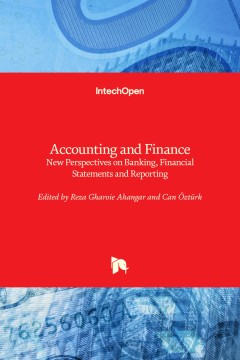Filter by

AI and Financial Markets
Artificial intelligence (AI) is regarded as the science and technology for producing an intelligent machine, particularly, an intelligent computer program. Machine learning is an approach to realizing AI comprising a collection of statistical algorithms, of which deep learning is one such example. Due to the rapid development of computer technology, AI has been actively explored for a variety o…
- Edition
- -
- ISBN/ISSN
- 9783039362257
- Collation
- 230 hlm; ill., lamp.,
- Series Title
- -
- Call Number
- -

Africa’s digital solutions to tackle COVID-19
African countries are using technology in many new ways to fight the coronavirus pandemic. This report highlights some of the best digital solutions and estimates the investments required to implement the technology on a wider scale. The European Investment Bank prepared this report with the support of the United Nations Development Programme and the consulting firm BearingPoint.
- Edition
- -
- ISBN/ISSN
- 9780000000681
- Collation
- -
- Series Title
- -
- Call Number
- 650

A Fair Share of Tax : A Fiscal Anthropology of Contemporary Sweden
Tax compliance; Reciprocity; Ethnography; Economic anthropology; Welfare; Exchanges; Taxpayer; Marcel Mauss; Swedish Tax Agency; quid-pro-quo exchange; Fiscal anthropology; Swedish tax; Behavioural economics; Economic exchanges and reciprocity; Tax as a gift; Public economics; Progressive marginal tax; Contributive and distributive balancing
- Edition
- -
- ISBN/ISSN
- 978-3-319-69772-7
- Collation
- 136 hlm
- Series Title
- -
- Call Number
- -

Accounting and Finance
Accounting and finance are common terms for users of financial information. Nowadays the reporting of financial as well as non-financial information of an entity, and efficiency in the banking system, are considered to be important issues by creditors, investors, and managers of financial markets.Over four sections this book addresses topics including national accounting standards and financial…
- Edition
- -
- ISBN/ISSN
- 9781839681998
- Collation
- oer.unej.ac.id
- Series Title
- -
- Call Number
- -

34. International Public Finance Conference: April 24–27, 2019 Antalya / TU…
- Edition
- -
- ISBN/ISSN
- 978-605-07-0704-5
- Collation
- -
- Series Title
- -
- Call Number
- -
- Edition
- -
- ISBN/ISSN
- 978-605-07-0704-5
- Collation
- -
- Series Title
- -
- Call Number
- -

2023-0288 Central, Eastern and South-Eastern Europe (CESEE) Bank Lending Survey
The CESEE Bank Lending Survey is a unique instrument developed in the context of the Vienna Initiative to monitor cross-border banking activities and deleveraging in Central, Eastern and South-Eastern Europe. It serves to better understand the determinants/constraints influencing credit growth in the region and to gain forward-looking insights into the strategies of cross-border banks and marke…
- Edition
- -
- ISBN/ISSN
- -
- Collation
- -
- Series Title
- -
- Call Number
- -

The Governance of Insurance Undertakings = Corporate Law and Insurance Regula…
This open access volume of the AIDA Europe Research Series on Insurance Law and Regulation brings together contributions from authors with different legal cultures. It aims to identify the legal issues that arise from the intersection of two disciplines: insurance law and corporate/company law. These legal issues are examined mainly from the perspective of European Union (EU) law. However, ther…
- Edition
- 1
- ISBN/ISSN
- 9783030858179
- Collation
- X, 360 hlm ill; lamp
- Series Title
- 6
- Call Number
- -

An Introduction to Cognitive Economics = The Science of Mistakes
This book introduces readers to “cognitive economics,” a rapidly emerging interdisciplinary science built on economic, psychological, and data scientific foundations. Throughout the book, economist Andrew Caplin provides new approaches to help scholars collaborate and solve problems that can shape economic outcomes and bridge the gap between theoretical knowledge and the real world. Divide…
- Edition
- 1
- ISBN/ISSN
- 9783031730429
- Collation
- XI, 158 hlm; ill., lamp.,
- Series Title
- -
- Call Number
- -

Economic Evaluation of Sustainable Development
This book is open access under a CC BY 4.0 license. This book presents methods to evaluate sustainable development using economic tools. The focus on sustainable development takes the reader beyond economic growth to encompass inclusion, environmental stewardship and good governance. Sustainable Development Goals (SDGs) provide a framework for outcomes. In illustrating the SDGs, the book emp…
- Edition
- 1
- ISBN/ISSN
- 9789811363894
- Collation
- XXIII, 145 ill; lamp
- Series Title
- -
- Call Number
- -

Chairperson Succession :Competences, Moderators, and Disclosure
This open access book empirically analyses the competences (input), moderators (process), and disclosure (output) of board chair succession practices for publicly listed organisations in Switzerland. As primus inter pares (Latin for first among equals), the chair of the board of directors holds a unique organisational position. For fulfilling the non-transferable duties pursuant to Article 716a…
- Edition
- 1
- ISBN/ISSN
- 978-3-658-40817-6
- Collation
- XXI, 261
- Series Title
- -
- Call Number
- -
 Computer Science, Information & General Works
Computer Science, Information & General Works  Philosophy & Psychology
Philosophy & Psychology  Religion
Religion  Social Sciences
Social Sciences  Language
Language  Pure Science
Pure Science  Applied Sciences
Applied Sciences  Art & Recreation
Art & Recreation  Literature
Literature  History & Geography
History & Geography